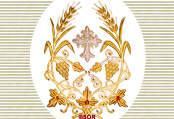
 |
|
||
| Commentaries on the Bible |
|
The Syriac Church Fathers produced many commentaries of the Syriac Bible. Their study of the Bible was a scholarly one, not a literal one.. St. Ephrem (4th century), the most celebrated Syriac theologian-poet says: Who is capable of comprehending the extent of what is to be discovered in a single utterance of yours? For we leave behind in it far more than we take away from it, like thirsty people drinking from a fountain. St. Ephrem produced a number of commentaries—on Genesis, most of Exodus, the Gospels (Diatessaron), Acts and the Pauline Epistles. John of Apamea (whose life is obscure) wrote a commentary on Ecclesiastics. Jacob of Serugh (died 521), a famous poet, belongs to this list since many of his poems are indeed Biblical commentaries. His contemporary, Philoxeus of Mabug (died 523), left commentaries on Matthew and Luke. "The chief luminary in the field of Syriac biblical exegesis in the seventh century," in Sebastian Brock's words, "is Jacob of Edessa (died 708) who left many works in this field." Other Syriac Orthodox commentators are: John of Dara, Moshe bar Kepho, and the polymath Bar `Ebroyo (1226-1286) whose Awsor Rozé 'Storehouse of Mysteries' represents the climax of the Syriac Orthodox commentary tradition. It must be stated that the Church of the East (today Assyrian Church of the East) had its share in producing Biblical commentaries. The works of Theodore of Mopsuestia (died 428) were translated into Syriac. The most celebrated author in the Church of the East is Mar Narsai (died ca. 500) who was contemporary to his Syriac Orthodox counterpart, Jacob of Serugh (died 521). The Catholicos of the Church of the East Isho' bar Nun (823-828) produced a commentary on the whole Bible. A series of commentaries were also produced by Isho'dad of Merv (flourished ca. 850). It is hoped that one day this massive body of commentaries can be used in producing a modern commentary which stems from the Syriac tradition. |
| Copyright © Syriac Orthodox Resources. All Rights Reserved. |
|
Author: George Kiraz, Ph.D. Last Updated: Feb 25, 2001 |